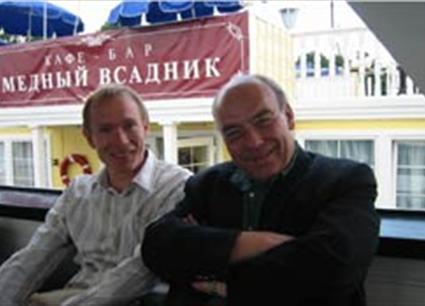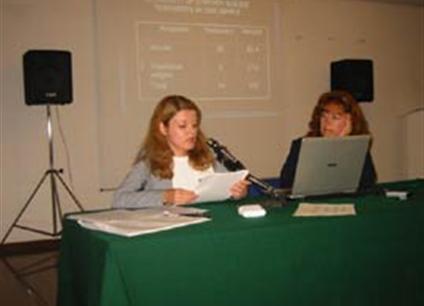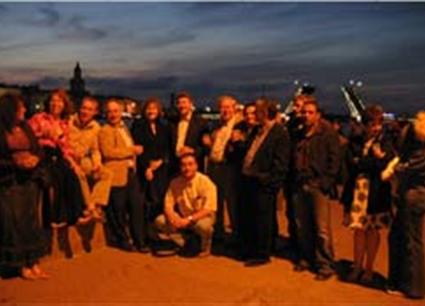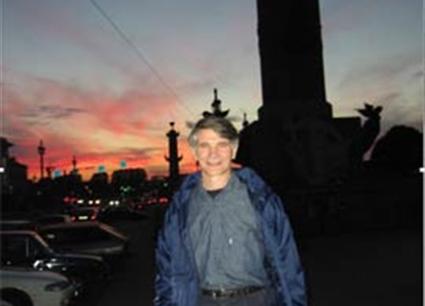Dr. Speckhard served as the Chair for the following groups:
- NATO Human Factors & Medicine Research and Technology Research Task Group 140- Psychosocial, Cultural and Organizational Aspects of Terrorism
- Dr. Speckhard served as the Co-Chair of the: NATO-Russia Research Task Group – 172 – Social Sciences Support to Military Personnel Engaged in Counter-Insurgency and Counter-Terrorism Operations
- Dr. Speckhard served as a member of the: NATO Human Factors & Medicine Research and Technology Research Task Group 159 – Child Soldiers as the Opposing Force
- Dr. Speckhard served as a member of the: NATO Human Factors & Medicine Research and Technology Research Task Group 179 – Moral Dilemmas and Mental Health Problems
Dr. Speckhard co-directed the following NATO Advanced Research Workshops:
- NATO Advanced Research Workshop – Budapest March 7-9, 2008 Terrorism: Understanding and Addressing the Root Causes of Radicalization among Groups with an Immigrant Heritage in Europe Directors, Anne Speckhard, Ph.D., Thomas Pick, Ph.D., Sebastian Gorka, Ph.D., Mokhtar Benabdallaoui, Ph.D.
- NATO Advanced Research Workshop – NATO Headquarters – Brussels, Jan 30–Feb 1, 2005 Ideologies of Terrorism: Understanding and Countering the Social, Psychological and Political Underpinnings of Terrorism Directors, Anne Speckhard, Ph.D., Mokhtar Benabdallaoui, Ph.D., Khapta Akhmedova, Ph.D.
Dr. Speckhard also served as a speaker at the following NATO events:
- “Psycho-Social Aspects of Hostage Taking,” Presentation given to the NATO Centre of Excellence Defence Against Terrorism Presentation to the Efficient Crisis Management to Mitigate the Effects of Terrorist Activities Course, February 28, 2012, Istanbul, TURKEY
- ”Assessing Psycho-Social Resilience in Diplomatic, Civilian & Military Personnel Serving in High Threat Security Environments: Counter Insurgency and Counter Terrorism Operations in Iraq,”Presentation given to the NATO Centre of Excellence Defence Against Terrorism Defense Presentation to the Efficient Crisis Management to Mitigate the Effects of Terrorist Activities Course, February 29, 2012, Ankara, TURKEY
- “Female Suicide Terrorism,” Presentation given to the NATO Centre of Excellence Defence Against Terrorism Defense Against Suicide Terrorism Course, January 25, 2012, Ankara, TURKEY
- ”Psycho-Social Motivations for Suicide Terrorism,” Presentation given to the NATO Centre of Excellence Defence Against Terrorism Defense Against Suicide Terrorism Course, January 23, 2012, Ankara, TURKEY
- ”Assessing Psycho-Social Resilience in Diplomatic, Civilian & Military Personnel Serving in a High Threat Security Environment:Counter Insurgency & Counter Terrorism Operations in Iraq” Presented to the NATO Research and Technology Military Mental Health and Ethical Dilemmas Group Meeting March 25, 2010, Bergen, Norway.
- “Moral Issues and Mental Health: Exploratory Research Examining Issues related to Military Responses to Minors and Children acting as the Opposing Force,” Presentation for the NATO Human Factors and Medicine Research Task Group 173 -Moral Dilemma’s and Military Mental Health , Nov 25, 2008, Paris.
- “Psycho-Social and Cultural Aspects of Terorrism: NATO RTG -140 Task Group” Chair. Sophia, Bulgaria, May 29, 2008.
- “Understanding and Addressing Militant Jihadi Terrorism in Europe” Presentation for the NATO Advanced Research Workshop – Indigenous Terrorism: Understanding and Addressing the Root Causes of Radicalisation among Groups with an Immigrant Heritage in Europe, Budapest, March 7, 2008.
- “Modeling Psycho-Social Resilience in Civil and Military Populations” Social Sciences Support to Military Personnel Engaged in Counter-Insurgency and Counter-Terrorism Operations NATO/Russia Exploratory Group (ET-079) NATO HQ, Brussels, Belgium September 3-4, 2007
- “Radicalization to Militant Jihad amongst First to Third Generation Immigrants in Europe” Keynote Address for NATO Advanced Research Workshop- Social Stress of Immigrants/Members of Minority Groups as a Factor in Terrorist Behaviour, April 28, 2007 Akiryat Shmona, Israel
- “Psychosocial, Cultural and Organizational Aspects of Terrorism”Report to the NATO Human Factors & Medicine Exploratory Team 067 – Educating Adaptable Military Leaders and Training Teams for Improvement of Coalition Operations, 15-17 Jan 2007. Paris
- “Psycho-Social Motivational Factors for Suicide Terrorism in Conflict and Non-Conflict Zones” Presentation to NATO Advanced Research Workshop – Suicide Bombers – the Psychological, Religious and Other Imperatives Lucy Cavendish College – Cambridge University 10-12 December, 2006.
- “The Response of Civil Society to Mass Terrorism: Modelling Psycho-Social Resilience to Terrorism” NATO Advanced Research Workshop – The Psychological Impact of Terrorist Act: How we can Better Help its Victims and Society -Nov 30, 2006, Amman, Jordan
- “Understanding Organizational, Ideological and Individual Aspects of Suicide Terrorism” – Presentation to the NATO RTG-140 Experts Meeting – Psychosocial, Cultural and Organizational Aspects of Terrorism, Rome, Nov 20-21, 2006.
- “Modeling Psycho-Social Resilience to Radiological Terrorism: Lessons Learned from Chernobyl and other Toxic Disasters” Paper presented to the NATO Advanced Research Workshop – Social and Psychological Affects of Radiological Terrorism October 23-24, 2006 Bratislava, Slovakia
- “Modeling Psycho-Social Resilience to Radiological Terrorism: Lessons from Chernobyl and other Toxic Disasters” Paper presented to the NATO/CCMS Pilot Study Workshop – Risk Assessment and Chernobyl Accident Consequences: Lessons Learned for the Future October 19, 2006, Kiev, Ukraine
- “Terror on the Internet: Induction of Secondary Trauma and other Psychological Mechanisms for Motivating Recruits to the Global Jihad” Paper presented to Hypermedia Seduction for Terrorist Recruiting – NATO Advanced Research Workshop 17-21 September, 2006 Eilat, Israel.
- “Psychological, Cultural and Organizational Aspects of Terrorism: Group and Individual Pathways and Motivations for Enacting Terrorism – Differences between Conflict and Non-Conflict Zones” Paper presented to the NATO Human Factors and Medicine Advisory Group Panel Meeting for the Mediterranean Dialogue, July 25, 2006, Amman, Jordan.
- “Child Warriors as the Opposing Force: Addressing the Psychological Issues for Soldiers and Child Combatants” Paper presented to the NATO Human Factors and Medicine Experts Exploratory Team Meeting –ET 068, Child Warriors as the Opposing Force July 5, 2006, Amsterdam.
- Observer – NATO Parlimentary Assembly Mediterranean Special Group Security Challenges in the Mediterranean and the Middle East July 2-3, 2006 Naples, Italy.
- “Psycho-Social and Cultural Aspects of Terrorism” Presentation to the NATO-Russia Counterterrorism Experts Meeting, June 20, 2006, Moscow, Russia.
- Chair/Organizer for the NATO Human Factors and Medicine Panel: Experts Team Meeting – HFM -140/RTG – Psychosocial, Organizational and Cultural Aspects of Terrorism June 26-27 Paris, France.
- “Differing Motivational Sets for Suicide Terrorism: Social and Psychological Factors in the Genesis of Suicide Bombing” Paper presented for NATO Advanced Research Workshop Social and Psychological Factors in the Genesis of Terrorism Castelvecchio Pascoli, Italy September 17, 2005
- “Researching Suicide Terrorism” Paper presented for the Human Factors & Medicine Panel Meeting on Psychosocial, Organisational and Cultural Aspects of Terrorism, Amsterdam, July 5, 2005.
- “Mass Media and Terrorism” Paper presented for the Human Factors & Medicine Panel Meeting on Psychosocial, Organisational and Cultural Aspects of Terrorism, Amsterdam, July 4-6, 2005.
- “Mass Media and Terrorism: The Question of How to Cooperate for the Public Good” Paper presented for NATO-Russia Counter-Terrorism Advisory Group Workshop, St. Petersburg, Russia, June 25, 2005.
- “Prevention Strategies and Promoting Resilience to Bioterrorism through Communication” Paper presented for the NATO Advanced Research Workshop: Risk Assessment and Risk Communication Related to Bioterrorism Ein Gedi, Israel, June 10, 2005.
- Chair for “National Experiences in Fighting Terrorism” panel of the Security through Science NATO Advanced Research Workshop: Scientific Collaboration for Defense against Terrorism Konstanz, Germany, April 15, 2005.
- “Free Speech & Motivational Strategies of Terrorism Ideologies”paper presented for the Security through Science NATO Advanced Research Workshop: Scientific Collaboration for Defense against Terrorism Konstanz, Germany, April 16, 2005.
- “Understanding Suicide Terrorism: The Psychology of Human Bombs” Paper presented for the NATO Advanced Research Workshop: Ideologies of Terrorism: Understanding and Countering the Social, Psychological and Political Underpinnings of Terrorism Brussels, Belgium, January 30, 2006.
- “Making of a Martyr: The Psychological Underpinnings of Suicide Terrorism” Keynote Address for Suicide Terrorism: Strategic Importance and Counterstrategies, NATO Advanced Research Workshop – Lisbon, June 10-14, 2004.
- Chair of the Working Group on Challenges to and Successes in Combating Terrorist Financing, Mediterranean & Middle East, for the NATO Defense College “Financial and Economic Aspects of the Fight Against Terrorism” – Rome, October 14-15, 2004.
- “Mechanisms of Generating Suicide Terrorism: Trauma and Bereavement as Psychological Vulnerabilities in Human Security: The Chechen Case” Keynote Address with Khapta Ahkmedova, Ph.D. at the Developing Strategies to Deal with Trauma in Children of Countries on the NATO Periphery in order to Assure the Social Stability Necessary for Post-Conflict Recovery and Reconstruction, Case Study: Developing a Strategy to address Post-Conflict Trauma in 12-15-year olds in Serbia, a NATO Advanced Research Workshop, Slovak Republic, March 6, 2004.
- “Suicidal Terrorists in Action: The Moscow Hostage Siege” – Keynote Address for the The Modern Roots of Terrorism: Contemporary Trends and Traditional Analysis, NATO Advanced Research Workshop – Prague, Jan 27, 2004
- “Terrorism & Religion the Plague of the 21rst Century: A Worldwide Perspective” Invited Research Presentation to the NATO Security Related Civil Science Committee, Brussels, May 6, 2003.
- “Waking up to Terror: Acute Stress Responses Post September 11th” Presentation to NATO-Russia Advanced Scientific Workshop: Social and Psychological Consequences of Chemical, Biological and Radiological Terrorism. March 26, 2002. NATO Headquarters –Brussels.

NATO Petersburg Conference Kees Wientjes & Yves Cuvelier Cruising on the Neva 
Nadya Tarabrina Presenting at Tuscany NATO Conference 
NATO Petersburg Conference Participants on the Neva 
NATO Petersburg Conference Valery Krasnov 
NATO Petersburg Conference Participants at Peterhof 
NATO Petersburg Conference Neva Bridge during White Nights
NATO Advanced Research Workshop – NATO Headquarters – Brussels, Jan 30–Feb 1, 2005 Ideologies of Terrorism: Understanding and Countering the Social, Psychological and Political Underpinnings of Terrorism – Anne Speckhard
“Terrorism is fast becoming the number one security threat faced by NATO member and partner countries. Defense against terrorism is multidimensional, involving technological approaches to safeguarding populations and installations, military and intelligence activities to penetrate and destroy terrorist organization networks alongside of academic, political and diplomatic approaches to understand and begin to get at the multifaceted root causes of terrorism. The NATO Advanced Research Workshops – Ideologies of Terrorism: Understanding and Countering the Social, Psychological and Political Underpinnings of Terrorism and Terrorism: Understanding and Addressing the Root Causes of Radicalization among Groups with an Immigrant Heritage in Europe brought together two groups of world-renowned scholars to examine the issue of how ideology is used to motivate and recruit individuals into terrorist activities and how policy makers can begin to address religious and non-religious ideologies that promote terrorism. Ideologies espoused by terror organizations are not fabricated in a social vacuum. On the contrary they are made up of a social dialogue of a type that resonates throughout and may spring up within societies in which terror organizations operate – often as a result of societal conditions that are perceived as oppressive or unjust within these societies as well as outside of them. Increasingly the Internet is being used as a means of promulgating terrorism promoting ideologies. Through video footage and photos from conflict zones focusing on human rights violations, terror organizations make a call to political violence from populations worldwide who by virtue of sympathy, ethnicity or religion make a link identifying themselves with those suffering within the conflict zones. In these cases an appeal is made for financial, logistical and militant support for the terrorist cause, a call that is increasingly being heeded within Europe especially by alienated migrant first through third generation citizens as well as others whose personal issues resonate with those they find being broadcast over the Internet. This creates a social context in which indigenous terrorism within Europe and the NATO countries increasingly becomes a threat. The topic of how terrorism ideologies are formulated, utilized and motivate for terrorism and how they can be contained is extremely relevant to current public policy and requires an understanding of the phenomena as well as a combined international policy strategy to approach it in a coordinated manner. Currently there is an extremely small empirical research database on which policy-makers may base their understanding of the political, social and psychological roots of terrorism; it’s genesis and the use of differing ideologies to motivate for acts of violence and even suicide in behalf of the terrorist cause. These advanced research workshops brought together two groups of individuals collecting data in the field and theorizing on the root causes of terrorism to contribute to and expanded our understanding of how terrorist ideologies are being used to motivate and recruit for terrorism and how to combat them.” Anne Speckhard, 2004